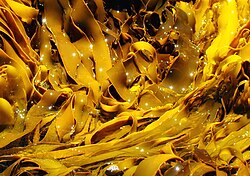
Back ፋይኮሎጂ Amharic علم الطحالب Arabic Ficoloxía AST Alqologiya Azerbaijani Альгология Bashkir Альгалогія Byelorussian Алгология Bulgarian Algologija BS Ficologia Catalan قەوزەناسی CKB

| Part of a series on |
| Biology |
|---|
 |
Phycology (from Ancient Greek φῦκος (phûkos) 'seaweed' and -λογία (-logía) 'study of') is the scientific study of algae. Also known as algology, phycology is a branch of life science.
Algae are important as primary producers in aquatic ecosystems. Most algae are eukaryotic, photosynthetic organisms that live in a wet environment. They are distinguished from the higher plants by a lack of true roots, stems or leaves. They do not produce flowers. Many species are single-celled and microscopic (including phytoplankton and other microalgae); many others are multicellular to one degree or another, some of these growing to large size (for example, seaweeds such as kelp and Sargassum).
Phycology includes the study of prokaryotic forms known as blue-green algae or cyanobacteria. A number of microscopic algae also occur as symbionts in lichens.
Phycologists typically focus on either freshwater or ocean algae, and further within those areas, either diatoms or soft algae.